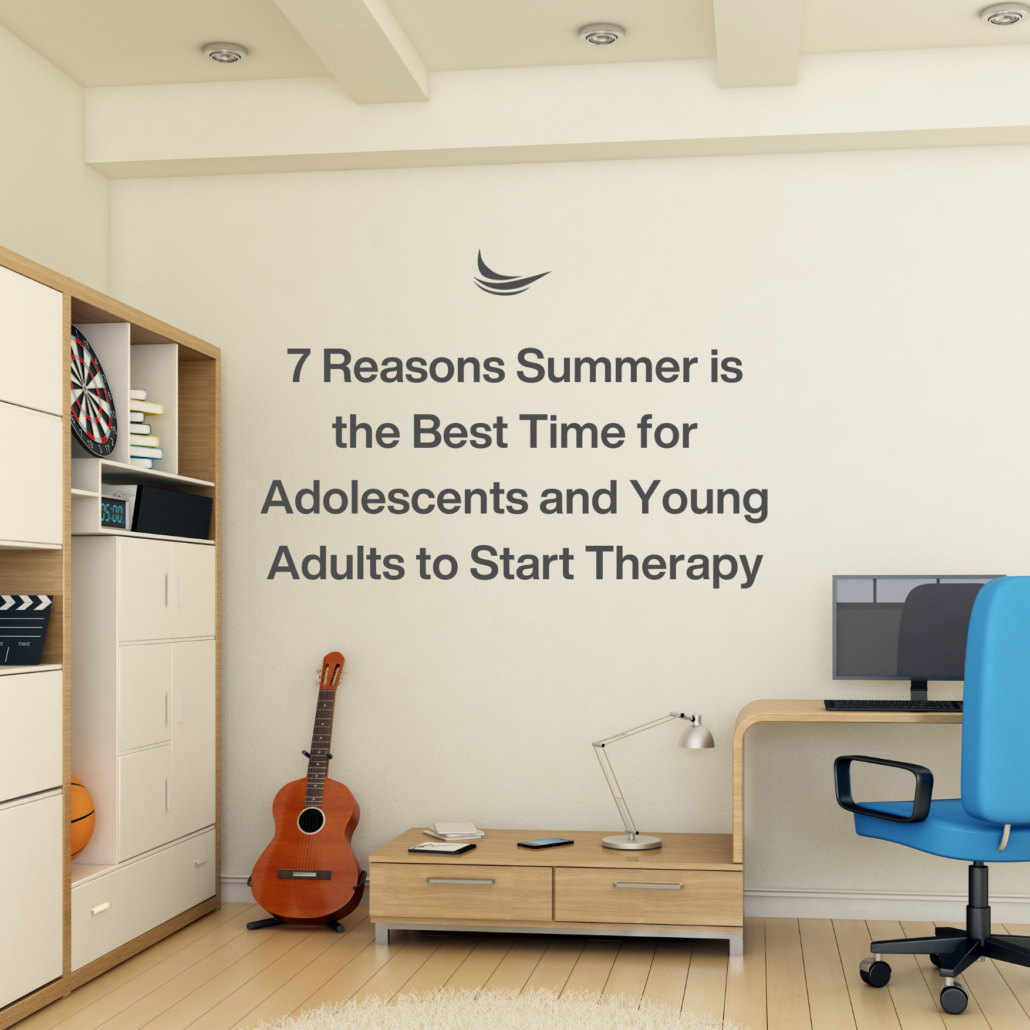7 Reasons Summer is the Best Time for Adolescents and Young Adults to Start Therapy
 School is out and summer is right around the corner. The responsibilities and pressures of many young people look very different this time of year. Students may seem happier and more relaxed, as stress lessens, and emotions appear regulated. However, adolescents and young adults may struggle to adjust and engage in maladaptive coping strategies.
School is out and summer is right around the corner. The responsibilities and pressures of many young people look very different this time of year. Students may seem happier and more relaxed, as stress lessens, and emotions appear regulated. However, adolescents and young adults may struggle to adjust and engage in maladaptive coping strategies.
Transitions within living arrangements can create tension and conflict, especially when expectations do not align with emotional responses and behaviors. Common concerns that show up at home include angry outbursts, irritability, relational distress, defiance, withdrawal, substance use, and lack of motivation. Those with underlying mental health conditions such as depression, anxiety disorders, post-traumatic stress disorder, and attention-deficit hyperactivity disorder may lose the built-in support that was present at school and begin to lose skills. It is important to have some continuity of care. Receiving therapy during the summer can help.
While the “best” time to start therapy is subjective, there are reasons that make summertime one of the best times to begin (or resume) your mental health journey. Summer treatment can help with the following and more–
Establish regular, outpatient care.
Along with sunny weather, summer vacation, and lazy days are reported improvements in mental health, opening more availability to establish outpatient care in the summer. Therapists tend to see predictable patterns of high waitlists and people waiting to seek treatment when in crisis. Establishing regular outpatient care in the summer helps ensure you are not on the waitlist but also helps secure a regular time on your therapist’s schedule that may not be available later in the year.
Create a routine for unstructured time.
Having weekly therapy sessions makes a significant difference in establishing a routine for many clients. Committing to attend therapy at a pre-arranged time is essentially practicing routines. Your therapist can help create a structure for your daily living plans, meeting you where you are.
Receive support to help cope with loneliness and fears.
The fear of missing out—that can be tough in the summertime! Seeing images and hearing about other people’s amazing adventures and experiences can be triggering. You may find yourself doom-scrolling and “in your feelings”. Thought-spiraling, depressive rumination, social anxiety, isolation, loneliness… whatever you are struggling with, your therapist can help support you.
Have flexibility in schedule after the demands of the school year.
One of the wonderful things for students is that summer can open flexibility in scheduling. Attending in-person sessions can become more convenient, which is a great way to increase connectedness and have a reason to leave your home. Did you know that you can access therapy anywhere within the state of Minnesota via telehealth? All you need is a reliable internet connection and access to a private, secure space for confidentiality.
Bring in the whole family.
Summer is a prime time to bring the whole family together for family therapy. Family therapy includes the client and at least one other person. We welcome traditional and non-traditional family arrangements, step-families or blended families, rainbow families, and created families. Summer is the perfect time to bring in your partner(s) as you navigate relational topics like jealousy and trust and work on improving the quality of your relationships.
Build a solid foundation for skills to support students and families.
Building a strong foundation of skills such as executive function skills should be ongoing, so they can be applied at the start of the school year. Examples of skills you may want to practice include social communication,emotional regulation and distress tolerance, anxiety management skills, interpersonal effectiveness, and coping skills.
Get connected to additional mental health support.
Now is a good time to talk to a mental health therapist about additional support that may be helpful, in addition to therapy. Options include medication management and specialty services to address concerns such as eating disorders and substance use. If needed, your therapist can also help you access more intensive care such as intensive outpatient treatment during the summer, and assist with the transition as you “step down” to outpatient therapy.
Written By: Charlotte Johnson, MA, LPCC



























